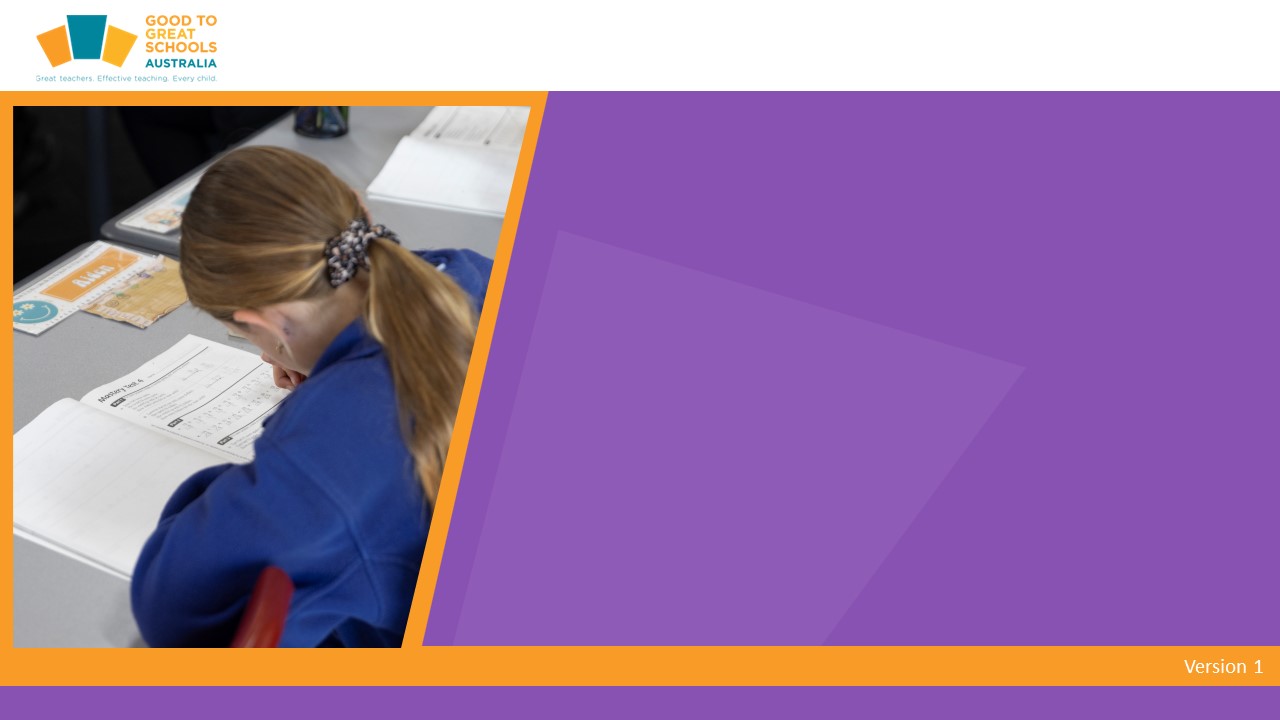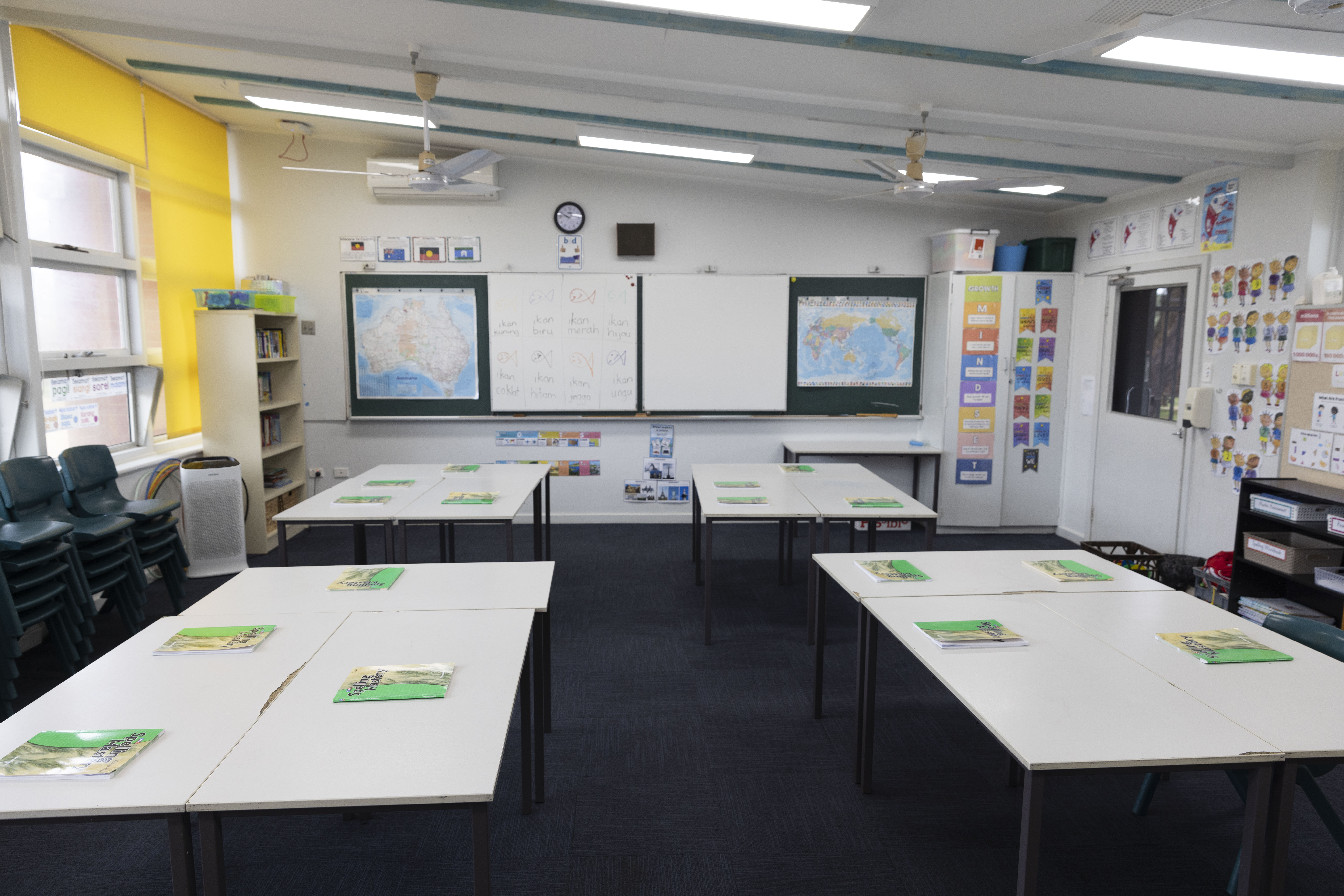Embed Effective Teaching in the Classroom
-
Module Introduction5 Topics
-
Introduction to Embedding Effective Teaching in the Classroom21 Topics|3 Tests
-
Cover
-
Lesson Objective
-
Opening the Lesson
-
Introduction to Embed Effective Teaching
-
Effective Teaching
-
Check Your Understanding
-
The Power of Fidelity in Effective Teaching
-
Structured Literacy: Building Blocks for Academic Success
-
Scenario – Structured Literacy
-
Optimising Learning: Zone of Proximal Development
-
Scenario – Zone of Proximal Development
-
Optimising Learning: Cognitive Load Theory
-
Scenario – Cognitive Load Theory
-
Video: Effective Teaching Interview
-
Check Your Understanding
-
Embedding into Daily Routines
-
Scenario – Effective Teaching Routines
-
Video: Embedding Effective Teaching
-
Test Your Understanding
-
Review
-
Lesson Completed!
-
Cover
-
Placement Assessment and Preparing for Learning22 Topics|3 Tests
-
Cover
-
Lesson Objective
-
Opening the Lesson
-
Professional Learning Standards, Techniques and Practices
-
Placement Tests to Set Objectives
-
Activities to Advance Use of Placement Tests
-
Importance of Setting Classroom Up
-
Reflect to Improve Setting Up the Classroom
-
Scenario – Classroom Setup
-
Check Your Understanding
-
Importance of Preparing for Learning
-
Self-Reflection on Preparing for Learning
-
Scenario – Preparing for Learning
-
Video: Preparing for Learning
-
Check Your Understanding
-
Embedding the Importance of Communicating Objectives to Students
-
Displaying Routines and Behaviour Standards
-
Scenario – Effective Communication
-
Video: Displaying Routines and Behaviour Standards
-
Test Your Understanding
-
Review
-
Lesson Completed!
-
Cover
-
Delivering Instruction and Modelling Techniques (Part 1)22 Topics|3 Tests
-
Cover
-
Lesson Objective
-
Opening the Lesson
-
Professional Learning Standards, Techniques, and Practices
-
Importance of Teaching for the Full Period
-
Teaching for the Full Period
-
Importance of Teaching the Full Lesson Fluently
-
Teaching the Full Lesson Fluently
-
Scenario – Enhancing Lesson Fluency
-
Check Your Understanding
-
Video – Teaching the Full Lesson and Fluently
-
Embedding Routines and Behaviour Standards
-
Check Your Understanding
-
Importance of Using Positive Motivation Strategies
-
Improve Positive Motivation Strategies
-
Importance of Providing Positive Praise and Affirmations
-
Providing Positive Praise and Affirmations
-
Scenario – Enhancing Positive Motivation Strategies
-
Video – Positive Motivation Strategies and Positive Praise
-
Test Your Understanding
-
Review
-
Lesson Completed!
-
Cover
-
Checking for Mastery and Model Techniques (Part 2)20 Topics|3 Tests
-
Cover
-
Lesson Objective
-
Opening the Lesson
-
Professional Learning Standards, Techniques, and Practices
-
Using Signals
-
Improving the Use of Signals
-
Video: Using Signals
-
Scenario – Improving Signal Usage
-
Check Your Understanding
-
Checking for Understanding
-
Improve Checking for Understanding
-
Video: Checking for Understanding
-
Scenario – Enhancing Checking for Understanding
-
Check Your Understanding
-
Correct Errors
-
Improving Error Correction
-
Scenario – Enhancing Error Correction Techniques
-
Test Your Understanding
-
Review
-
Lesson Completed!
-
Cover
-
Lead Techniques 119 Topics|3 Tests
-
Cover
-
Lesson Objective
-
Opening the Lesson
-
Professional Learning Standards, Techniques, and Practices
-
Individual Turns
-
Check Your Understanding
-
The Importance of Individual Turns
-
Improving Use of Individual Turns
-
Scenario – Improving Use and Delivery of Individual Turns
-
Video: Using and Improving Individual Turns
-
Check Your Understanding
-
Specific Group Errors
-
The Importance of Addressing Group Errors
-
Advancing Methods for Addressing Specific Group Errors
-
Scenario – Advancing Methods for Addressing Specific Group Errors
-
Video: Specific Group Errors
-
Test Your Understanding
-
Review
-
Lesson Completed!
-
Cover
-
Lead Techniques 222 Topics|3 Tests
-
Cover
-
Lesson Objective
-
Opening the Lesson
-
Professional Learning Standards, Techniques, and Practices
-
Understanding Modelling
-
Check Your Understanding
-
The Importance of Modelling
-
Enhance Modelling Practice
-
Scenario – Improving the Use of ‘Track With Me’
-
Video – Using Modelling
-
Embedding Track With Me
-
Embedding Read With Me
-
Check Your Understanding
-
Student Engagement
-
Embedding Paired Learning
-
Embedding Check For Understanding
-
Embedding Use Academic Vocabulary
-
Scenario – Improving Student Engagement
-
Video – Student Engagement
-
Test Your Understanding
-
Review
-
Lesson Completed!
-
Cover
-
Independent Work18 Topics|3 Tests
-
Cover
-
Lesson Objective
-
Opening the Lesson
-
Professional Learning Standards, Techniques, and Practices
-
Introduction
-
The Importance of Independent Work
-
Check Your Understanding
-
Embed and Improve Independent Work Procedures
-
Video – Improving Independent Work Procedures
-
Scenario – Improving Independent Work Procedures
-
Check Your Understanding
-
Independent Work Checks
-
Embed and Improve the Administration of Independent Work Checks
-
Scenario – Enhancing Independent Work Checks
-
Video – Administering Independent Work Checks Effectively
-
Test Your Understanding
-
Review
-
Lesson Completed!
-
Cover
-
Check for Mastery and Administering Program Assessments22 Topics|3 Tests
-
Cover
-
Lesson Objective
-
Opening the Lesson
-
Professional Learning Standards, Techniques, and Practices
-
Checking for Mastery
-
The Importance of Mastery
-
Check Your Understanding
-
Checklist for Checking for Mastery
-
Reflect on Checking for Mastery
-
Video – Checking for Mastery
-
Scenario – Reflective Mastery Check
-
Importance of Administering Program Assessments
-
Embedding Administering Program Assessments
-
Check Your Understanding
-
Remediate and Retest
-
The Importance of Remediate and Retest
-
Remediation Tables
-
Scenario – Teacher’s Remediation Journey
-
Video – Program Testing and Remediation
-
Test Your Understanding
-
Review
-
Lesson Completed!
-
Cover
-
Differentiating Effective Instruction to Reach all Learners21 Topics|3 Tests
-
Cover
-
Lesson Objective
-
Opening the Lesson
-
Professional Learning Standards, Techniques, and Practices
-
Differentiation
-
The Importance of Differentiation
-
Check Your Understanding
-
Examples of Differentiation 1
-
Examples of Differentiation 2
-
Examples of Differentiation 3
-
Examples of Differentiation 4
-
Check Your Understanding
-
Scenario – Implementing Differentiated Instruction
-
Video: Implementing Differentiation
-
Response to Intervention
-
RTI Tiers
-
Scenario – Implementing Response to Intervention
-
Video: Response to Intervention Methods
-
Test Your Understanding
-
Review
-
Lesson Completed!
-
Cover
-
Embedding Parent Engagement19 Topics|3 Tests
-
Cover
-
Lesson Objective
-
Opening the Lesson
-
Professional Learning Standards, Techniques, and Practices
-
The Importance of Parent Engagement
-
Maximise the Effect of Parent Visits
-
Check Your Understanding
-
Enhance Expectations
-
Engage by Displaying Student Work
-
Check Your Understanding
-
Video: Parent Engagement
-
Scenario – Engaging Parents with Displays
-
Celebrating with Students
-
Encouraging and Engaging Parents to Continue Learning at Home
-
Scenario
-
Video – Celebrating with Parents
-
Test Your Understanding
-
Review
-
Lesson Completed!
-
Cover
-
Module Completion Survey1 Topic
Tests
Participants 259
Self-Reflection on Preparing for Learning
ddewell@goodtogreatschools.org.au March 27, 2024

Self-Reflection on Preparing for Learning
Educators reflecting on their preparation for learning is crucial for enhancing instructional effectiveness. This reflection prompts educators to evaluate how efficiently they organise materials before each lesson and assess whether these practices contribute to seamless transitions and minimal disruptions in the classroom. Preparation routines impact student engagement and overall learning outcomes. Identifying areas for improvement and developing strategies to enhance preparation processes can optimise classroom engagement and instructional time. Through this reflective process, educators can create a well-prepared learning environment that maximises teaching and learning experiences for all participants.
Here are some questions to facilitate your reflection:

- Am I confident in delivering lesson content seamlessly at the required pace due to thorough preparation?
- Do I find that my preparation efforts contribute to minimising distractions and disruptions, thus maximising instructional time?
- Are my students able to participate fully and maintain focus on their learning tasks due to my preparation efforts?
- Do they have ample time to practise and consolidate their skills during class?
- Do I review each lesson beforehand to determine the necessary materials and resources?
- How effectively do I organise and place resources in accessible locations for students?
- Am I using routines for resource distribution and collection to streamline classroom processes?
- Do I regularly check that all materials are stored properly and in good condition?
- Have I established clear routines for students to collect and return resources as they enter and exit the classroom?
- Are students prepared with necessary materials, such as whiteboards, when needed for learning activities?
- Do students know how to submit work quietly and efficiently, without disrupting the class flow?

